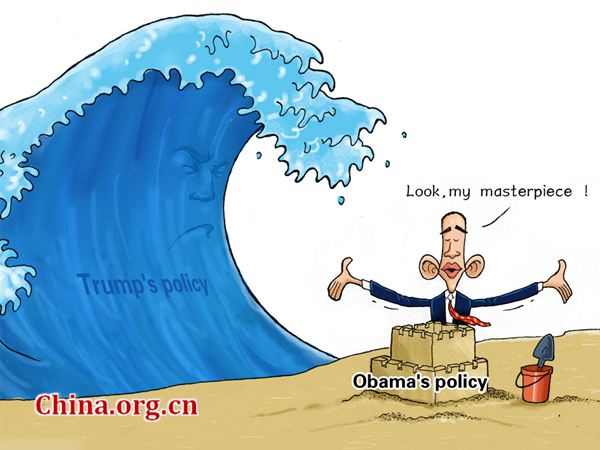Implications of Trump's risky gamble on climate change
- By Niranjan Sahoo
 0 Comment(s)
0 Comment(s) Print
Print E-mail China.org.cn, April 10, 2017
E-mail China.org.cn, April 10, 2017
|
|
|
The overwhelming force [By Zhai Haijun / China.org.cn] |
In an unprecedented move, U.S. President Donald Trump signed an Executive Order on March 28 reversing President Barack Obama's climate and clean energy initiatives. Under Presidential Order, the Environmental Protection Agency is expected to take a fresh look at the Clean Power Plan (CPP), a key regulatory measure taken by the Obama administration to cut down the emissions of greenhouse gas, particularly in the electricity sector.
The key motivation behind Trump's calculated gamble is to create more jobs and to boost the sagging economy. It would seem to be a logical follow-up to his election campaign narrative that climate change was a big "hoax" created by China. Utterly sceptical of the historic Paris Agreement on climate change, Trump pledged to restore the prominent role of fossil fuels in power generation, and, in particular, bring jobs back in the traditional coal industry.
While he is not going to get a free hand in everything, as his policy moves are likely to be opposed by many, including the Republican Party leadership who would not like to see America step away from its global responsibilities, the presidential directive on clean power, especially the dismantling of CPP, will surely damage America's long battle to shift away from coal-based electricity.
The CPP that was an outcome of long negotiations among enterprises, health advocates, and state governments as well as the federal government and its key agencies, has now been rendered useless by a single diktat.
Studies have estimated the EPA would have saved a mammoth 1 billion tons of carbon-dioxide emissions by 2030 and America would have reaped an estimated $55 billion in public health benefits per year from the program. Importantly, apart from the health, economic and climate costs, such a decision takes America back to 19th century technology.
Second, the problem with Trump's order is that, by pulling out the CPP, the federal government will have to show policy shifts elsewhere. It will have to lift the ban on new coal leases and allow mining rights to untapped mines in different regions. According to analysts, the Presidential Order will trigger automatic withdrawal of six Obama-era memoranda on climate change.
Finally, while Trump's decision does not signal America's disengagement from the Paris Agreement or other international obligations on climate and environment, it sends a wrong signal to a world slowly waking up to the negative effects of climate-threatening emissions.
Such a retreat by the world's second-largest polluter not only would encourage a number of countries to weaken their own climate pledges, but lower the confidence in America's leadership on issues involving global commons.
In the longer term, such a pullout will have serious implications for broader U.S. engagement on range of global issues including clean energy technologies.
Yet, the American pullout from its climate commitments does not mean the world will be less rich in terms of supporters for environmental protection.
Given Trump's economic orientation and strong anti-climate rhetoric during the course of electioneering, major nations were anticipating something of this kind. In fact, China and the European Union (EU) have expressed even stronger resolve to push initiatives and resources to fulfil the goals enshrined in the Paris Agreement.
Note the response of China's Foreign Ministry spokesperson that, regardless of what the U.S. administration does, "China will stick to its pledges on policies related to climate change." Many analysts were speculating a contrary response - that China, too, would take this opportunity to water down its climate pledges.
China, which has integrated its climate pledges in its Five-Year Plan, may turn out to be the top gun in the climate change battle. It must be recalled that China has pledged to bring down its carbon dioxide intensity to an astounding 60 percent below 2005 levels and expanding its forest carbon stock volume to the tune of 4.5 billion cubic meters by 2030.
Importantly, China has planned to increase non-fossil fuels by 20 percent in its total energy mix by 2030. To do this, in statistical terms, China has pledged to deploy a mammoth 800 to 1000 gigawatts in non-fossil capacity. With installed capacity in solar power generation increasing 400-fold from the 2005 level, China is a serious contender to meet the UNFCCC target.
Its level of investment in renewable energy sources is unmatched by any nation. Importantly, all recent activities of China (including President Xi's announcement during last year's G-20 meeting specifying measures like nation-wide cap and emission rights trading system) clearly indicate that the world's largest emitter of pollution is far more active than it was in the Copenhagen years. In short, China has turned the tables on the climate battle with lofty goals and big ticket initiatives.
Niranjan Sahoo is a Senior Fellow of the Observer Research Foundation, New Delhi.
Opinion articles reflect the views of their authors, not necessarily those of China.org.cn.







Go to Forum >>0 Comment(s)